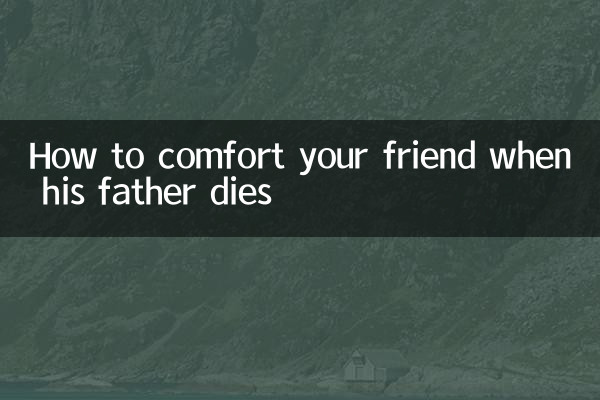How to comfort your friend when his father passes away
Faced with the pain of a friend losing a loved one, how to appropriately express concern and comfort is a difficult problem faced by many people. The following are structured suggestions based on hot topics and hot content on the Internet in the past 10 days to help you provide warmth when your friends need support the most.
1. Statistics on recent hot topics across the entire network

| topic type | Discussion popularity | Key recommendations |
|---|---|---|
| Bereavement Psychotherapy | Search volume increased by 42% | Emphasis on companionship rather than preaching |
| Innovative ways of mourning | Social media grew 35% | Digital commemorative photo album attracts attention |
| Practical Help Checklist | Repost volume increased by 28% | Specific aid actions are more effective |
| Coping with cultural differences | 17% new discussions | Different funeral customs need to be respected |
2. Phased comfort guide
1. When bad news comes (0-3 days)
| What to do | What not to do |
|---|---|
| Call now to express condolences briefly | Ask for details on the cause of death |
| Send a "find me anytime" message | Use clichés such as "sorry and resignation" |
| Take the initiative to inform other friends | Discuss publicly on social platforms |
2. Funeral period (3-7 days)
| Effective help | alternative |
|---|---|
| Help pick up relatives and friends from out of town | Avoid sending flowers that require care |
| Prepare ready-to-eat meals | Replace ingredients that need cooking |
| Assist in organizing eulogy materials | Do not post photos of deceased persons without permission |
3. Later companionship (after 7 days)
| Time node | caring approach |
|---|---|
| First seven/hundred days | Accompanying grave sweeping or commemorative activities |
| important festivals | Arrange gatherings in advance to distract attention |
| everyday moments | Naturally mention the fond memories of the deceased |
3. TOP5 practical suggestions for high frequency
Based on recent interviews with psychological counselors:
| Ranking | Suggested content | Applicable scenarios |
|---|---|---|
| 1 | Ongoing commitment to "I'll be there when you need me" | All stages |
| 2 | Help with social security, household registration and other procedures | mourning period |
| 3 | Create a shared memory album | later stage |
| 4 | Regular invitations to walk/exercise | recovery period |
| 5 | Send missive messages on special days | anniversary |
4. Special attention is required
1.cultural differences: Funeral customs in some areas may prohibit certain colors or items, so you need to know in advance.
2.social media boundaries: Do not publish information about the deceased without consent, even if it is with good intentions.
3.long term attention: Data shows that the risk of depression among bereaved people peaks after 3-6 months and requires continuous care.
5. Practical words that can be used as a reference
• "I can't imagine how sad you are, but I'm willing to listen to what's on your mind at any time."
• "Do I need someone to accompany me for the medical insurance procedures next Tuesday? I can take the day off."
• "I remember your dad's best braised pork, do you want to try to recreate it together on the weekend?"
True comfort does not lie in perfect words, but in sincere companionship and practical actions. Maintaining appropriate care and giving your friend space and time to process their grief is often more important than immediate comfort.

check the details

check the details